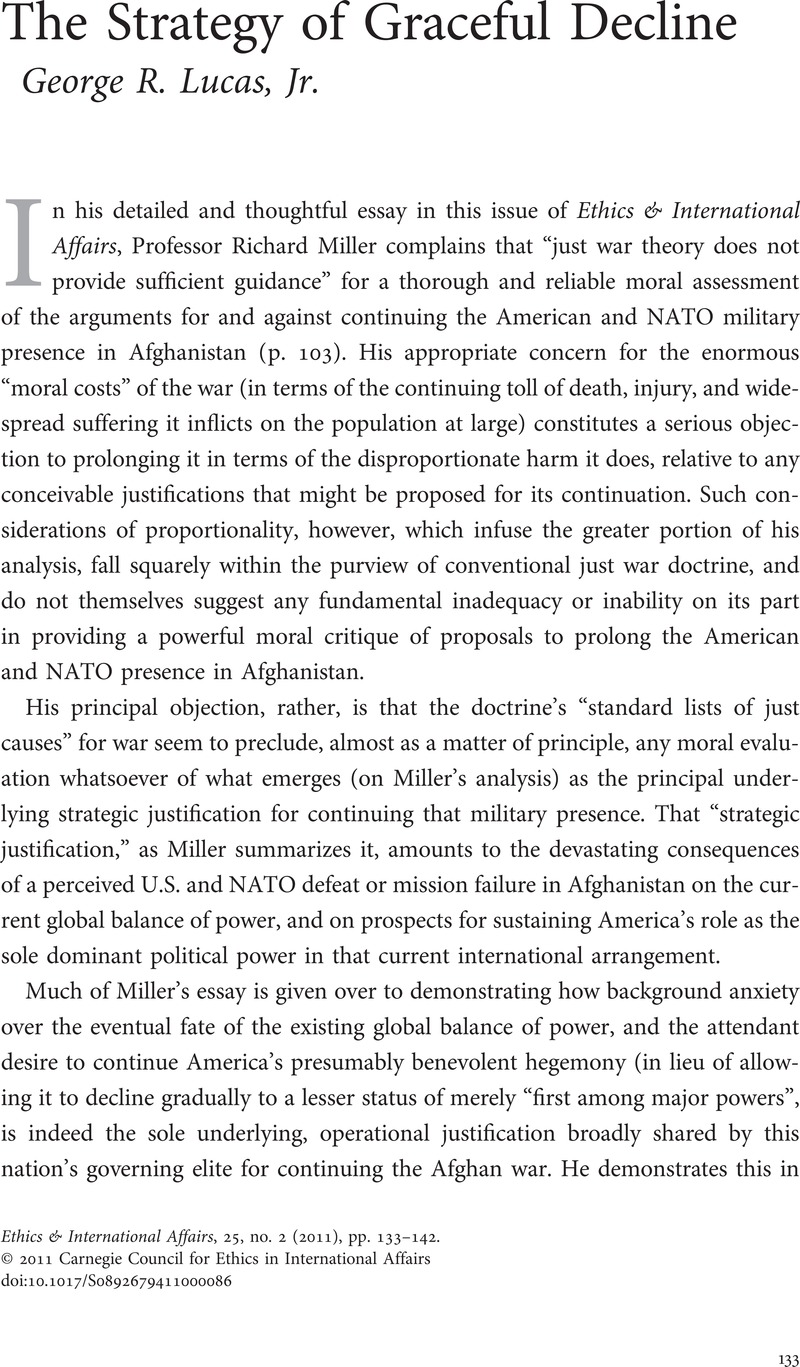Article contents
The Strategy of Graceful Decline
Published online by Cambridge University Press: 30 June 2011
Abstract

- Type
- Symposium
- Information
- Copyright
- Copyright © Carnegie Council for Ethics in International Affairs 2011
References
NOTES
1 Alberto Gentili, On the Laws of War (c. 1612), Book I, Ch. 14, in Rolfe, T John C., trans., The Classics of International Law (Oxford: Clarendon Press, 1933), vol. 2, pp. 61–66Google Scholar; and Emer de Vattel (c. 1758), The Law of Nations, Book III, Ch 1(5); Ch 3 (42, 44), in Charles G. Fenwick, trans., The Classics of International Law (Washington, DC: Carnegie Institution, 1916), pp. 280–340.
2 I owe this distinction to an unpublished paper by Anthony Lang, St. Andrew's University.
3 Francisco di Vitoria, “De Juri Belli: Q2, Article 2” (1539), in Pagden, Anthony and Lawrance, Jeremy, eds. Vitoria: Political Writings. (Cambridge: Cambridge University Press, 1991), pp. 233–29Google Scholar.
5 Jeffrey D. McCausland, “Present Status of ISAF Efforts in Afghanistan” (report delivered at the U.S. Naval Academy, February 17, 2011). McCausland, a former Dean of the Army War College, is currently a Senior Fellow at the Carnegie Council, a CBS News correspondent, and a frequent visitor to Afghanistan. For an account of the popular impact of this program, see Aryn Baker, “Afghan Idol: A Subversive TV Hit,” Time Magazine, March 24, 2008; available at www.time.com/time/world/article/0,8599,1725113,00.html. For an account of more recent programming, such as Eagle Four, see www.tolo.tv.
6 Singer, P. W., Messera, Heather, and Orino, Brendan, D.C.'s New Guard: What Does the Next Generation of American Leaders Think? (Washington, D.C.: The Brookings Institution, February 2011)Google Scholar; available at www.brookings.edu/~/media/Files/rc/reports/2011/02_young_leaders_singer/02_young_leaders_singer.pdf. For corroborating data, and opinions of Afghans of all ages on a variety of salient issues, see the statistical snapshots featured in Livingston, Ian S., Messera, Heather L., and O'Hanlon, Michael, eds., Brookings Afghanistan Index: Tracking Variables of Reconstruction and Security in Post-9/11 Afghanistan (Washington, D.C.: The Brookings Institution, February 28, 2011)Google Scholar; available at www.brookings.edu/~/media/Files/Programs/FP/afghanistan%20index/index.
7 For example, Scanlon, T. M., “The Proper Role of Intention in Military Decision-Making,” in Wertheimer, Roger, ed., Empowering Our Military Conscience: Transforming Just War Theory and Military Moral Education, “Military and Defence Ethics Series” (London: Ashgate Press, 2010), pp. 77–92, esp. pp. 82–83Google Scholar. Tim Scanlon and Judith Thompson are among the prominent moral philosophers who have long questioned the sense in which a moral agent's intentions can be said to affect not merely the degree of culpability or blameworthiness attached to an action, but the very moral permissibility of the action itself. Examples of the latter problem, and of skepticism concerning the traditional role of an agent's intentions according to the “doctrine of double effect,” include strategic or “terror” bombing, and physician-administered lethal doses of pain-relieving drugs to terminally ill patients. How (these philosophers wonder) do otherwise impermissible acts in these contexts suddenly become permissible (and not just excusable) solely on the basis of what the agent performing them thought at the time? Without going into detail, I hold in response that acts of war are among a species of acts whose moral permissibility does plausibly (and not mistakenly) hinge on the agent's individual or collective intention in undertaking them.
- 3
- Cited by


